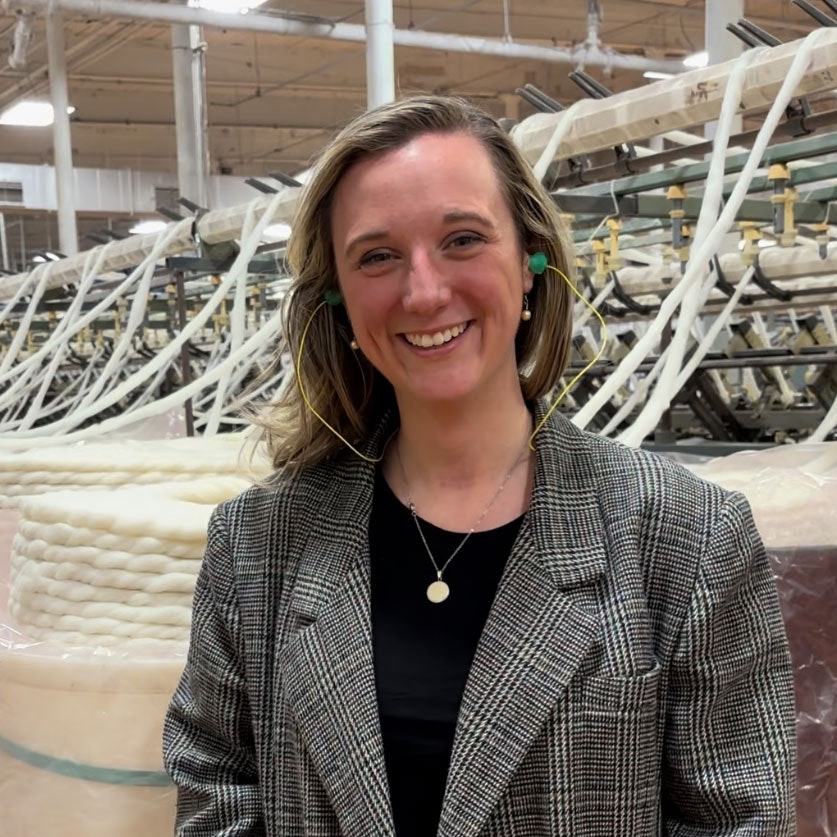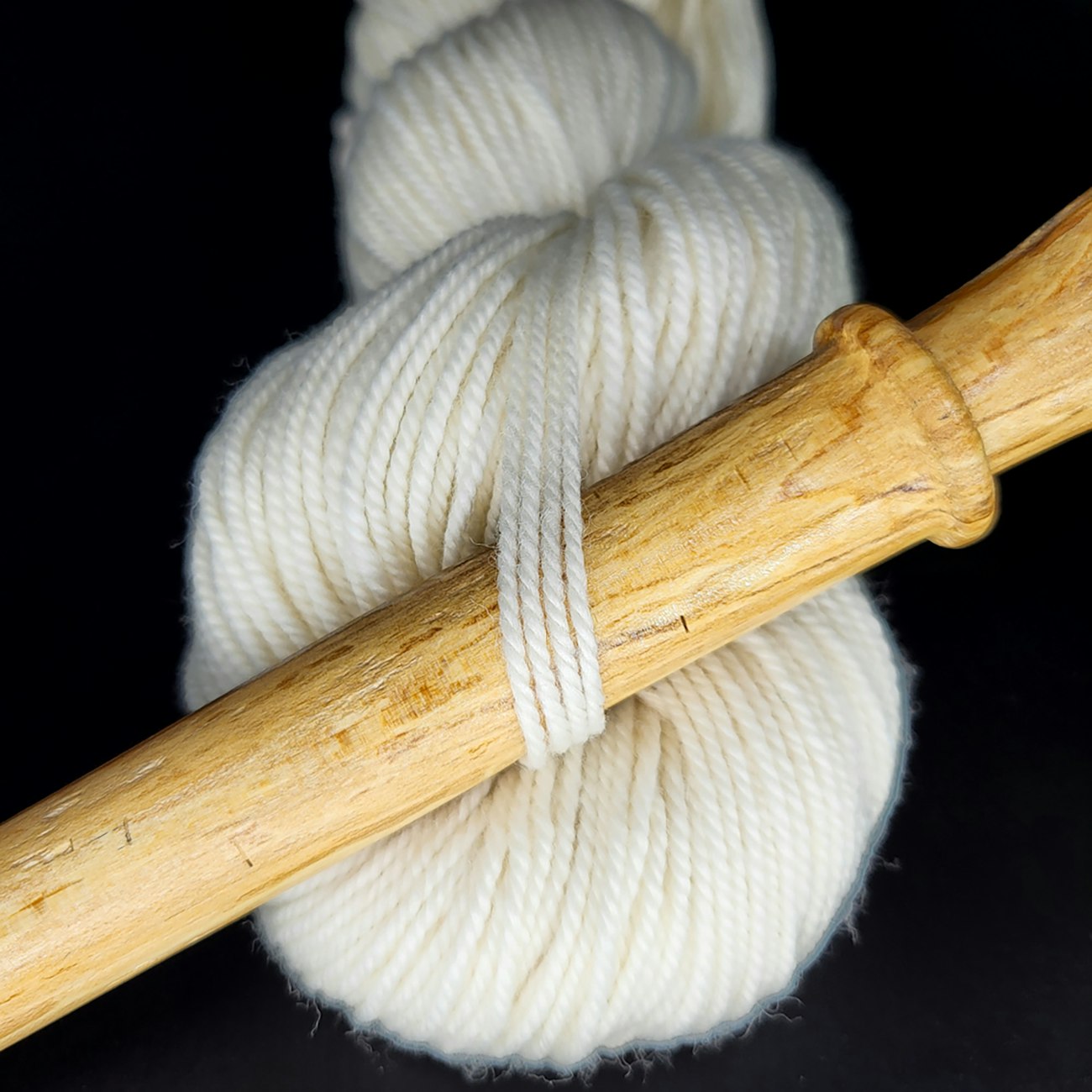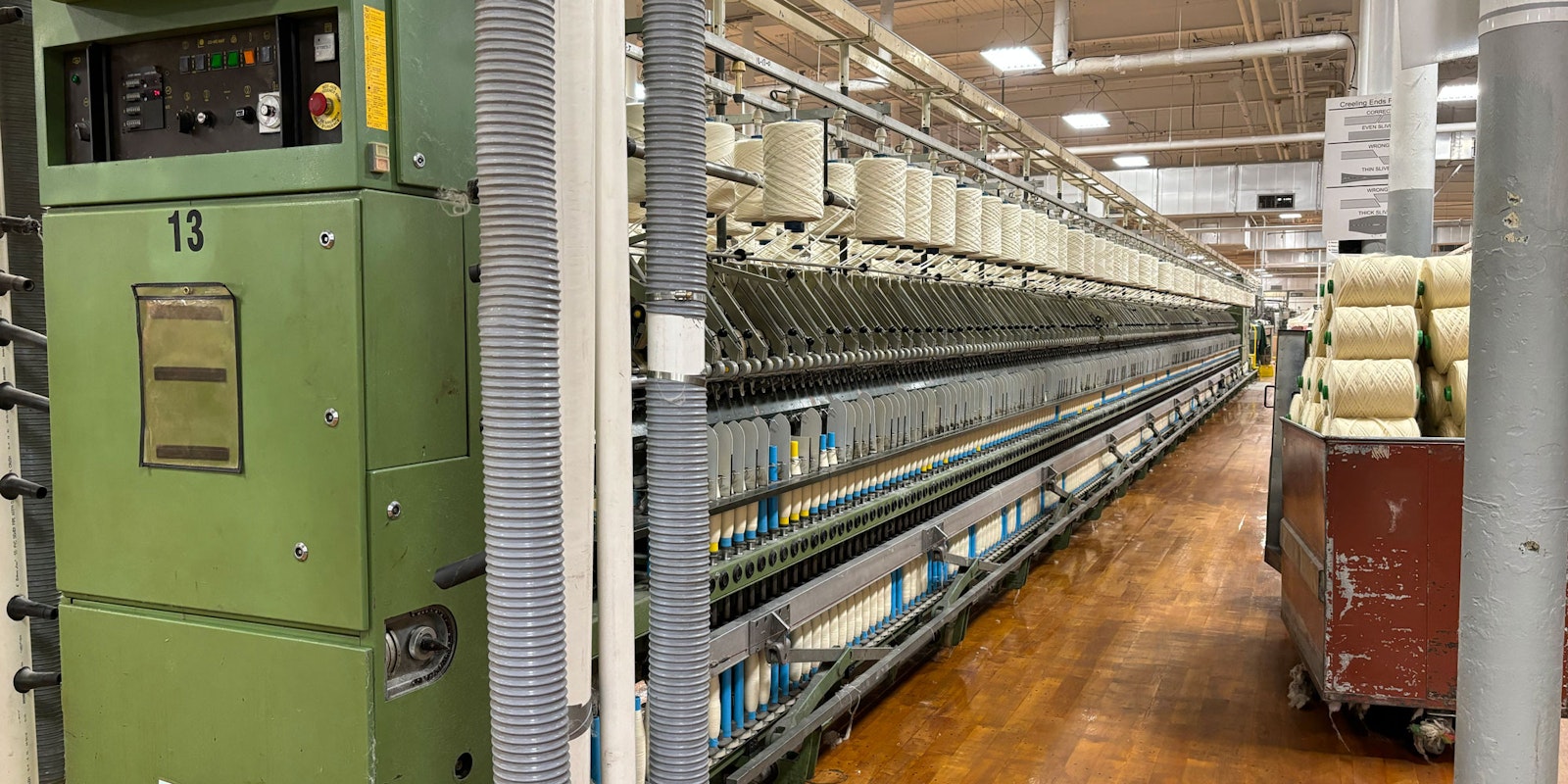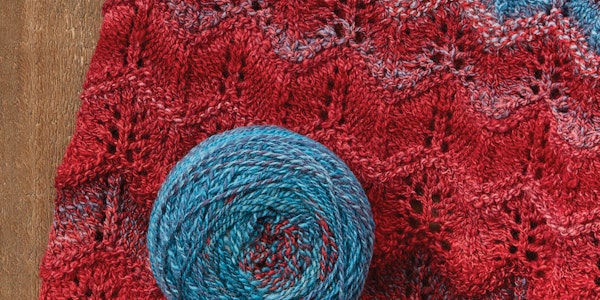Subscriber Exclusive
Thoroughly Modern Milling: Meridian Mill House
Bringing state-of-the-art spinning technology to an historic textile community, from industrial synthetic yarn to traceable wool.
Bringing state-of-the-art spinning technology to an historic textile community, from industrial synthetic yarn to traceable wool. <a href="https://farmfiberknits.com/thoroughly-modern-milling-meridian-mill-house/">Continue reading.</a>
https://www.datocms-assets.com/101500/1712360385-meridian-spools-of-sliverheader.jpg?auto=format&w=900
As I approached the home of Meridian Mill House in Ranlo, North Carolina, I was struck by the houses. Small, single story, nearly identical houses on small lots surround the large brick mill complex. These are mill houses, built in the 1920s and 30s to house workers employed at the cotton mills that gave birth to the town. Mill towns like this were once found throughout the Carolinas. As textile manufacturing moved overseas in the 1990s, most of these towns were emptied, then demolished, the mill buildings converted to antique malls and trendy food halls.
The mill houses in Ranlo are now privately owned, but the mill is still humming. Instead of cotton, Meridian Specialty Yarn group spins wool and synthetic yarns for apparel, upholstery, automotive, military, and industrial textiles. They also produce yarn for hand knitting and crochet. Since 2020, the Meridian Mill House division has offered high quality natural fiber yarn made in the US to hand dyers and other small businesses.
 Cotton mills such as this one, located about 5 miles from Ranlo and pictured in the 1897 annual report of the Bureau of Labor Statistics of the State of North Carolina, were a central fixture in the region for decades.
Cotton mills such as this one, located about 5 miles from Ranlo and pictured in the 1897 annual report of the Bureau of Labor Statistics of the State of North Carolina, were a central fixture in the region for decades.
A Modern Mill in a 100-Year-Old Shell
Meridian’s facility in Ranlo is a spinning mill. Their dye house is an hour north, in the town of Valdese. I was met by Hannah Everhart, the sales representative for Meridian Mill House. After outfitting me with earplugs, Hannah showed me around.

Hannah Everhart of Meridian Mill House. Bins of combed wool top behind her are fed into the milling machine to make sliver, then yarn.
From the raw materials room, where clean fiber is stored in bales and large bins, to the various spinning lines, to skeining and packaging, the mill is bright, spacious, modern, and surprisingly clean. Unlike other mills I’ve visited, there were no loose fibers floating through the air or coating the machinery. The old wooden floors were spotless.
For many years, Meridian manufactured popular acrylic yarns by the ton for a major craft yarn brand. When that brand decided to move production overseas, Meridian’s state-of-the-art spinning and dyeing facilities and skilled workforce were re-deployed to serve the luxury craft market. They learned to work with fine wools and other natural fibers to produce yarn store quality yarns.
Ethically Produced Yarn Made in America
In recent years, the knitting community has become more thoughtful about the origins of the yarns and fibers we use. Many factors contribute to yarn we can feel good about: the well-being of the animals and land that grow the fiber, fair labor practices and working conditions, and the environmental impact of processing and transportation.
Meridian is one of only a handful of Responsible Wool Standard (RWS) certified spinning mills in the US. They spin RWS-certified Shaniko wool, grown in the American West and processed at Chargeurs, an RWS-certified scouring and superwash facility in South Carolina. Since all phases of production are within the continental United States, transportation costs are reduced.
 Rodanthe is a worsted-weight non-superwash yarn using Shaniko Wool.
Rodanthe is a worsted-weight non-superwash yarn using Shaniko Wool.
The yarn bases are all named for North Carolina locations. In addition to Shaniko wool (superwashed or not), Meridian stocks 19.5-micron superwash US-grown Merino; 21.5-micron US-grown Merino; 28-micron US-grown Territorial wool for yarn that is sturdier, but still soft; and 40 micron New Zealand wool suitable for carpets and other hard-wearing textiles. All the wool is processed in the US.
Meridian’s expertise shines in blending both natural and synthetic fibers with wool. Silk, cashmere, alpaca, cotton, and linen are all available. Nylon can be added for durability, stellina adds some sparkle, and rayon and acrylic neps create tweed.
 Jockey’s Ridge Worsted is Shaniko wool blended with black and brown tweed neps.
Jockey’s Ridge Worsted is Shaniko wool blended with black and brown tweed neps.
SUBSCRIBER EXCLUSIVE
As I approached the home of Meridian Mill House in Ranlo, North Carolina, I was struck by the houses. Small, single story, nearly identical houses on small lots surround the large brick mill complex. These are mill houses, built in the 1920s and 30s to house workers employed at the cotton mills that gave birth to the town. Mill towns like this were once found throughout the Carolinas. As textile manufacturing moved overseas in the 1990s, most of these towns were emptied, then demolished, the mill buildings converted to antique malls and trendy food halls.
The mill houses in Ranlo are now privately owned, but the mill is still humming. Instead of cotton, Meridian Specialty Yarn group spins wool and synthetic yarns for apparel, upholstery, automotive, military, and industrial textiles. They also produce yarn for hand knitting and crochet. Since 2020, the Meridian Mill House division has offered high quality natural fiber yarn made in the US to hand dyers and other small businesses.
 Cotton mills such as this one, located about 5 miles from Ranlo and pictured in the 1897 annual report of the Bureau of Labor Statistics of the State of North Carolina, were a central fixture in the region for decades.
Cotton mills such as this one, located about 5 miles from Ranlo and pictured in the 1897 annual report of the Bureau of Labor Statistics of the State of North Carolina, were a central fixture in the region for decades.
A Modern Mill in a 100-Year-Old Shell
Meridian’s facility in Ranlo is a spinning mill. Their dye house is an hour north, in the town of Valdese. I was met by Hannah Everhart, the sales representative for Meridian Mill House. After outfitting me with earplugs, Hannah showed me around.

Hannah Everhart of Meridian Mill House. Bins of combed wool top behind her are fed into the milling machine to make sliver, then yarn.
From the raw materials room, where clean fiber is stored in bales and large bins, to the various spinning lines, to skeining and packaging, the mill is bright, spacious, modern, and surprisingly clean. Unlike other mills I’ve visited, there were no loose fibers floating through the air or coating the machinery. The old wooden floors were spotless.
For many years, Meridian manufactured popular acrylic yarns by the ton for a major craft yarn brand. When that brand decided to move production overseas, Meridian’s state-of-the-art spinning and dyeing facilities and skilled workforce were re-deployed to serve the luxury craft market. They learned to work with fine wools and other natural fibers to produce yarn store quality yarns.
Ethically Produced Yarn Made in America
In recent years, the knitting community has become more thoughtful about the origins of the yarns and fibers we use. Many factors contribute to yarn we can feel good about: the well-being of the animals and land that grow the fiber, fair labor practices and working conditions, and the environmental impact of processing and transportation.
Meridian is one of only a handful of Responsible Wool Standard (RWS) certified spinning mills in the US. They spin RWS-certified Shaniko wool, grown in the American West and processed at Chargeurs, an RWS-certified scouring and superwash facility in South Carolina. Since all phases of production are within the continental United States, transportation costs are reduced.
 Rodanthe is a worsted-weight non-superwash yarn using Shaniko Wool.
Rodanthe is a worsted-weight non-superwash yarn using Shaniko Wool.
The yarn bases are all named for North Carolina locations. In addition to Shaniko wool (superwashed or not), Meridian stocks 19.5-micron superwash US-grown Merino; 21.5-micron US-grown Merino; 28-micron US-grown Territorial wool for yarn that is sturdier, but still soft; and 40 micron New Zealand wool suitable for carpets and other hard-wearing textiles. All the wool is processed in the US.
Meridian’s expertise shines in blending both natural and synthetic fibers with wool. Silk, cashmere, alpaca, cotton, and linen are all available. Nylon can be added for durability, stellina adds some sparkle, and rayon and acrylic neps create tweed.
 Jockey’s Ridge Worsted is Shaniko wool blended with black and brown tweed neps.
Jockey’s Ridge Worsted is Shaniko wool blended with black and brown tweed neps.
[PAYWALL]
Serving Small Yarn Businesses
The Meridian Mill House division is focused on providing American made yarn to small yarn businesses. They collaborate with retailers and small yarn companies who wish to create custom private label yarns, with a minimum order of 500 pounds. They will source the fiber, spin, dye, and wind the yarn into balls or skeins. They can even label the skeins, so they arrive ready for store shelves.
WoolTribe Yarn was the first hand-dyer to buy yarn from Meridian Mill House back in 2000. Co-owner Ladianne Henderson said, “Over the past 4½ years of working with Meridian, we have had the opportunity to collaborate in a number of ways. We appreciate that Meridian is RWS-certified, ensuring the Shaniko Wool we source through them comes from the caring and reputable ranches in the Shaniko family. We are grateful to partner with such an amazing company staffed by such dedicated professionals.”
Jeane de Coster, former owner of Elemental Affects yarn company, worked with Meridian to make Coastal, a wool/silk/linen blend yarn offered by Elemental Affects and Sincere Sheep. Jeane says:
I needed a new yarn that I couldn’t easily make with my other mills. I sourced all of my other yarns directly from farms and carefully ushered them through the shearing, scouring, and spinning process at various locations and mills across the country. However, the yarn I wanted to make was a true worsted yarn and a blend. I didn’t think I could easily match my vision without using a full worsted mill. And then I realized that Meridian Specialty Yarn Group was a good possibility.
While it is difficult to make a true “farm yarn” with Meridian because they work best with commercially prepared combed top, they had committed to Shaniko Wool company. This combination allowed me to design a yarn supporting this great wool program and blend in silk and flax, resulting in my true dream yarn.
Meridian welcomes new wholesale accounts and offers new wholesale customers 10% off their first order with coupon code friend.
They keep the most popular yarn bases in stock, so there are no long lead times. There is no minimum order requirement; Meridian will happily fill a dyer’s order for just a couple of skeins to experiment with. The yarns are available in either 2-kilogram cones or 100-gram skeins ready for the dyepot. Many of their fibers are available as top for handspinners.
What if you’d like to try Meridian’s yarns, but you’re not buying for resale? Meridian Mill House sells yarn and fiber directly to makers via their Etsy shop. You, too, can get 10% off your first order by using coupon code THANKYOU. The Etsy shop is also the place to find deals on mill ends.
Keep in mind that these yarns are “ready-to-dye.” They will not reveal their true softness and character until you wash the knitted fabric or dye the yarn.
Sandi Rosner (she/her) learned to knit in the late 1970s from the instructions in the back of a magazine. She now works as a freelance designer, technical editor, writer and teacher. When Sandi isn’t knitting, she usually has her nose in a book. Find more of Sandi’s work at www.sandirosner.substack.com.
 Cotton mills such as this one, located about 5 miles from Ranlo and pictured in the 1897 annual report of the Bureau of Labor Statistics of the State of North Carolina, were a central fixture in the region for decades.
Cotton mills such as this one, located about 5 miles from Ranlo and pictured in the 1897 annual report of the Bureau of Labor Statistics of the State of North Carolina, were a central fixture in the region for decades.
 Rodanthe is a worsted-weight non-superwash yarn using Shaniko Wool.
Rodanthe is a worsted-weight non-superwash yarn using Shaniko Wool. Jockey’s Ridge Worsted is Shaniko wool blended with black and brown tweed neps.
Jockey’s Ridge Worsted is Shaniko wool blended with black and brown tweed neps. 

